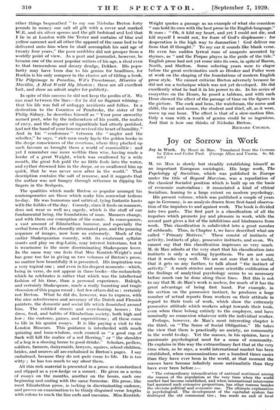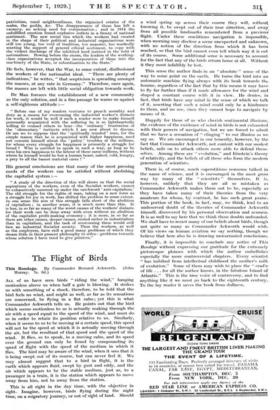Joy or Sorrow in Work
M. DE MAN is slowly but steadily establishing himself as an important European sociologist. His large work, The Psychology of Socialism, which was published in Europe under the title of Beyond Marxism, was a repudiation of the classical Socialist position which is built up on the basis of economic materialism : it enunciated a kind of ethical Socialism, leaning to a large extent on modern psychology.
His present volume, which was published a couple of years ago in Germany, is an analysis drawn from first-hand observa- tion of the impulses to and against work. The book is divided into two parts. The first part is a classification of all the impulses which promote joy and pleasure in work, while the second part gives a list of the inhibitions and hindrances from work. This classification is subdivided into a great number of subheads. Thus, in Chapter 1, we have described what are called " Primary Motives." These consist of instincts of activity, instincts of play, possessive instincts, and soon. We cannot say that this classification impresses us very much, M. de Man admits at the very start that his classification into instincts is only a working hypothesis. We are not sure that it works very well. We are not sure that it is useful, that it gets us any further, to talk about " the instinct of activity." A much stricter and more scientific codification of the findings of analytical psychology seems to us necessary before much can be done along these lines. But this is not to say that M. de Man's work is useless, for much of it has the great advantage of being first hand. For example, in his section on the possessive instinct, he produces a large number of actual reports from workers on their attitude in regard to their tools of work, which show the extremely. possessive attitude which workers adopt towards their tools, even when these belong entirely to the employer, and have nominally no connexion whatever with the individual worker.
Perhaps, however, de Man's most interesting chapter is the third, on " The Sense of Social Obligation." He takes the view that there is practically no society, no community in the world to-day. Yet the masses, in his opinion, have a passionate psychological need for a sense of community. He explains in this way the extraordinary fact that at the very time when, as he says, a world international market has been established, when communications are a hundred times easier than they have ever been in the world, at that moment the masses have become infinitely more nationalistic than they have ever been before :-
" The extraordinary intensification of national sentiment among the masses of the population at the very time when the world market had become established, and when international intercourse had assumed such extensive proportions, has other reasons besides the obvious political and economic one. The ultimate explanation is psychological. The development of the capitalist system has destroyed the . old communal ties ; has made an end of local
patriotism, rural neighbourliness, the organized estates of the realm, the guilds, &c. The disappearance of these has left a vacancy, an aching need for compensation ; and in 1914 the unfulfilled emotion found explosive outlets in a frenzy of national sentiment. The new social ties which the workers had created in the shape of their political and industrial organizations were still too young, too void of tradition, too" anaemic, too markedly wanting the support of general ethical sentiment, to cope with the violent discharge of the inhibited herd instinct in the field of nationalism. Bowing before the storm, the leaders of the working- class organizations accepted the incorporation of these into the machinery of the State, or subordination to the State."
He feels, however, that the War, to some extent, disillusioned the workers of the nationalist ideal. " There are plenty of indications," he writes, " that scepticism is spreading amongst the masses, at any rate in Germany." Therefore, once again, the masses are left with little social obligation towards work.
De Man foresees the establishment of a new community as the only solution, and in a fine passage he warns us against a self-righteous attitude :—
" Before one of my readers ventures to preach morality and duty as a means for overcoming the industrial worker's distaste for work, it would be well if such a reader were to make himself personally acquainted with the suffering he is so lightheartedly willing to counsel others to bear—the ordinary' frustration of the ' elementary' instincts which I am now about to discuss. Or are we to suppose that the ' spiritually minded' man, for the simple reason that he is acquainted with higher happiness, need not concern himself about the ' paltry' troubles of the millions, for whom every struggle for happiness is primarily a struggle for bread ? Who is entitled to speak in such a way, as long as he owes his own happiness to the labour of these same millions, without whom he himself would be but a human beast, naked, cold, hungry, a prey to all the basest material cares ? "
His general conclusions are that many of the most pressing needs of the workers can be satisfied without abolishing the capitalist system :-
" A study of the direction of this will shows us that the social aspirations of the workers, even of the Socialist workers, cannot be exhaustively summed up under the catchword ` anti-capitalism: The old struggle for the rights of man, taking on a new form as a struggle for joy in work, has shifted the problem to some extent. In one sense the aim of this struggle falls short of the abolition of capitalism ; in another sense, it is much more than this. It is less, in so far as many of the worst causes of the workers' distaste for their work can be done away with even without an abolition of the capitalist profit-making economy ; it is more, in so far as there are other causes, deeper causes, rooted rather in industrialism than in capitalism, and the task of overcoming these would still face an industrial Socialist society. Thus the workers, as well as the employers, have still a good many problems of which they dream little in their present philosophy to solve—problems towards whose solution I have tried to give pointers."

































 Previous page
Previous page